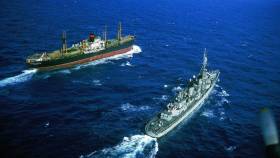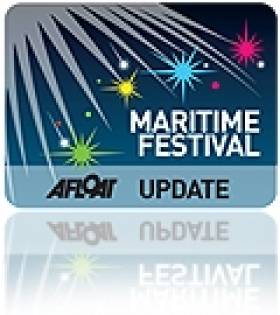Displaying items by tag: Sea Shanty
Podcast: Enda O'Coineen, The Sea Shanty Running Down to Cuba & Lots More
It is strange how things happen. In the week in which Fidel Castro died and there has been such controversy about how President Higgins eulogised him and ‘shipped’ a lot of criticism for what he said and while the airwaves heard a lot of iased opinions on all sides of the debate about Castro and how he treated his people, I was sent pictures of the naval blockade of Cuba in October of 1962. They showed cargo ships moving towards the American Navy, carrying weaponry which had the world on the edge of nuclear catastrophe. I was just starting out as a journalist when all that happened.
It is a long time ago but created an indelible photographic memory of what was happening at the other side of the world. Now that I look back, it was interesting that ships and the sea focussed on it. So this week when I was preparing the latest edition of my radio programme and looking through CDs for a musical inclusion, what should come to hand first but the CD - OCEAN’ – the first solo CD by Cork shanty singer Pat Sheridan.
I had him on the programme in an earlier edition, talking about sea shanties, their purpose, how they were composed and sung. I found it a fascinating discussion because the first reference to a shanty is in a manuscript dating back to 1400.
Sea shanties were songs sung on board sailing ships to provide rhythmic co-ordination for the sailors, to reduce the strain of the labour of hauling sails and other work aboard the old sailing ships. As steam replaced sail and the real square rig sailors began to fade away from the seas, shanties could have also vanished as did most of the sailing ships. The last known ‘shantyman,’ the man who led the singing of the shanty, was Stan Hugill, who collected and saved a huge number of shanties from all over the world.
All of that information is by way of introducing you to ‘Running Down to Cuba,’ which Pat Sheridan sings on the programme this week. It was sung by sailors as they took the square riggers there to collect cargoes of sugar.
There’s a lot more on the programme too, but the way in which that shanty came to my attention in this particular week was fascinating.
RNLI Mechanic Plots Online Course For Rosses Point Shanty Fest
#MaritimeFestivals - Organisers of the Rosses Point Shanty Festival didn't have far to cast their net when they needed someone to design their new website.
The maritime festival in aid of Sligo Bay RNLI landed a handy catch in a web designer with the sea flowing through his veins.
Not only is Daryl Ewing the mechanic for Sligo Bay's lifeboat and skipper of Ewing’s Sea Angling and Boat Charters, he is also a dab hand at plotting a course in web design.
The new website gives all the details for Rosses Point’s big event from 14 to 16 June, including the programme and details on performers who are drawn from throughout Europe.
As previously reported on Afloat.ie, the festival is now in its fourth year and has become Ireland’s premier shanty event.
"It’s great to see such a brilliant festival celebrating one of Sligo's best assets and maritime history," said Ewing. "I hope it continues long into the future, and encourage everybody to come out, take part and join in the festivities for such a great cause."

























































